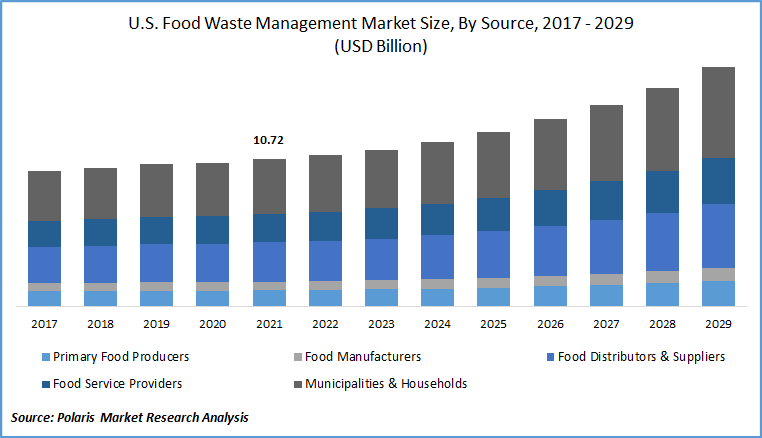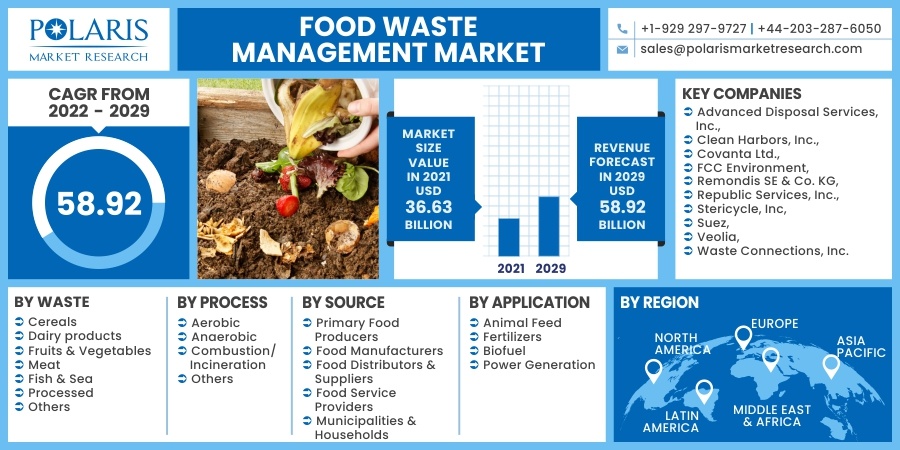
Food Waste Management Market Share, Size, Trends, Industry Analysis Report, By Waste (Cereals, Dairy Products, Fruits & Vegetables, Meat, Fish & Sea, Processed); By Process; By Source; By Application; By Region; Segment Forecast, 2022 - 2029
- Published Date:Jan-2022
- Pages: 105
- Format: PDF
- Report ID: PM1862
- Base Year: 2021
- Historical Data: 2017 - 2020
Report Outlook
The global food waste management market was valued at USD 36.63 Billion in 2021 and is expected to grow at a CAGR of 6.6% during the forecast period.
The rising environmental concern along with the increasing population across the globe is expected to drive the growth of the industry. Discarded packaged eatables reach into the landfills that produce methane gas which contributes to global warming and climate change.
The research study provides a comprehensive analysis of the industry, assessing the market on the basis of various segments and sub-segments. It sheds light on the competitive landscape and introduces food waste management market key players from the perspective of market share, concentration ratio, etc. The study is a vital resource for understanding the growth drivers, opportunities, and challenges in the industry.
 Know more about this report: request for sample pages
Know more about this report: request for sample pages
With the growing population worldwide, the production and consumption of meals have been rising over the years that leading to increased wastage of meals. As of now, around 56% of the total world’s population live in urban areas, which is expected to increase in the coming years is responsible for generating more wastage owing to a rising preference for variety in consumables, especially among millennials.
Mostly, the wastage takes place at different levels of the food supply chain, right from agricultural production, storage & transportation to processing, distribution, and consumer. Poor harvesting techniques or left-over eatables on the fields during agricultural production accelerates the demand for wastage systems. The spoilage during transportation, overstocking, spoilage before purchase, poor quality of meals are the major drivers propelling the industry growth.
The covid-19 outbreak had a positive impact on the food waste management market. The pandemic had significantly impacted the purchasing and consumption habit of consumers. The countries across the globe witnessed the increased hoarding of meals by the consumers owing to fear of lockdowns and strict regulations, which led to the increased wastages, further accelerating the demand for the food waste management market.

Know more about this report: request for sample pages
Industry Dynamics
Growth Drivers
The consumer preference for consumables has gradually changed over the years. Nowadays, people are inclined towards exotic and convenient products. The wastage generated from these products has led to the increased demand for debris management. Based on the report of the FAO of the United Nations, an estimated 1.3 billion tons of meals is lost each year globally. The rising environmental concern across the globe is another major factor driving the growth of the industry. When consumables of collected for disposal, the wastage goes into the landfills, where it produces methane gas which is a cause of global warming and climate change.
Furthermore, the rising number of consumable dump management organizations and government initiatives is paving the way for increased demand for the market. Some of the organizations that work to support the market globally include AgriMax (Europe), Brothers Produce (United States), City Harvest (United States), Compass Group (United Kingdom), and many others.
Report Segmentation
The market is primarily segmented on the basis of waste, process, source, application, and region.
|
By Waste |
By Process |
By Source |
By Application |
By Region |
|
|
|
|
|
Know more about this report: request for sample pages
Insight by Process
On the basis of process, the market is segmented into aerobic, anaerobic, combustion/incineration, and others. The anaerobic digestion management segment is expected to account for the largest share over the forecast years. This type of management system is used in both the industrial and domestic sectors. It involves a process by which microorganisms break down biodegradable material in the absence of oxygen. It is widely used in industrial applications owing to its ability to capture harmful greenhouse gases.
Insight by Source
On the basis of source, the market is further categorized into primary producers, manufacturers, distributors & suppliers, service providers, and municipalities and households. Municipalities & household sector is expected to account for the highest share in the coming years.
Food wastage at the household level is one of the biggest contributors to global waste. Improper management, stockpiling, hoarding of perishables are the major drivers accelerating the growth of the food waste management market. The wastage at municipalities includes commercial and domestic debris generated within the areas of the municipality. A higher need for disposal of municipal dump leads to a higher demand for debris management systems.
Geographic Overview
Europe is expected to account for the major market share over the forecast period. Improper management of wastage in the region is the major factor that leads to market growth. According to the UNEP Food Waste Index 2021, around 931 million tons of debris were generated in 2019, out of which 26% were from the hospitality industry, 61% were from households, and 13% were from retail.
Asia Pacific is projected to witness significant growth in the near future. The region is responsible for a high amount of wastage during production and transportation. The Chinese government is proposing several programs to reduce consumable wastage. Public education activities such as ‘The Clean Your Plate Campaign’ are working for the anti-food debris behavior. The business operators are adopting new business models for debris management using various technologies.
Competitive Insight
Some of the major players operating in the food waste management market include Advanced Disposal Services, Inc., Clean Harbors, Inc., Covanta Ltd., FCC Environment, Remondis SE & Co. KG, Republic Services, Inc., Stericycle, Inc, Suez, Veolia, and Waste Connections, Inc. These international market players are focusing on developing the waste management technologies in order to reduce wastage generated across the globe.
Food Waste Management Market Report Scope
|
Report Attributes |
Details |
|
Market size value in 2021 |
USD 36.63 Billion |
|
Revenue forecast in 2029 |
USD 58.92 Billion |
|
CAGR |
6.6% from 2022 - 2029 |
|
Base year |
2021 |
|
Historical data |
2017 - 2020 |
|
Forecast period |
2022 - 2029 |
|
Quantitative units |
Revenue in USD million/billion and CAGR from 2022 to 2029 |
|
Segments covered |
By Waste, By Process, By Source, By Application, By Region |
|
Regional scope |
North America, Europe, Asia Pacific, Latin America, Middle East & Africa |
|
Key Companies |
Advanced Disposal Services, Inc., Clean Harbors, Inc., Covanta Ltd., FCC Environment, Remondis SE & Co. KG, Republic Services, Inc., Stericycle, Inc, Suez, Veolia, and Waste Connections, Inc. |
In today’s hyper-connected world, running a business around the clock is no longer an option. And at Polaris Market Research, we get that. Our sales & analyst team is available 24x5 to assist you. Get all your queries and questions answered about the food waste management market report with a phone call or email, as and when needed.
